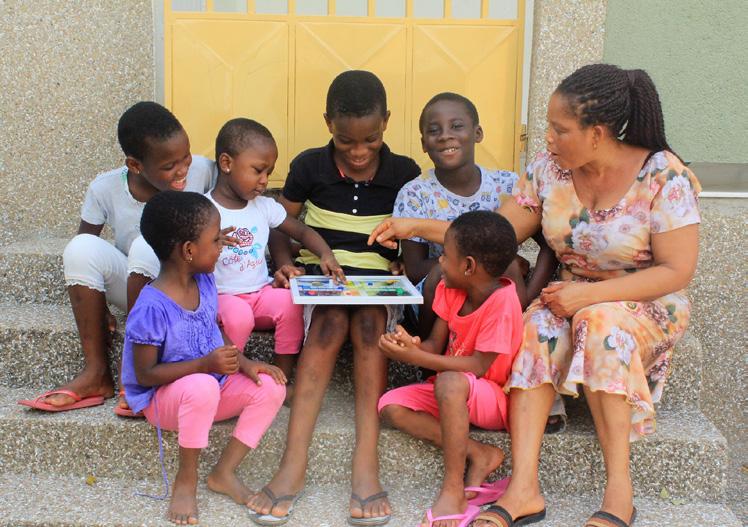3.1.2 FAMILY-BASED CARE
him or her to return to the family, we carefully
with the authorities on implementing quality
facilitate and support this process in line with
foster care through knowledge transfer or
In accordance with the UN Convention on the
the Guidelines for the Reintegration of
developing and distributing quality materials.
Rights of the Child, children have the right to
Children. Should the home situation no longer
In other countries our SOS parents are
care and protection, even if their own family
allow it, we work with the child protection
registered as foster parents.
cannot look after them. Our first priority is to
authorities to find the most suitable care
make their family more resilient so they can
option for the child.
stay together. However, if this is not in the
Youth care The aim of our youth programmes is to
interest of the child, or if there is no family who
Permanent care
equip young people with the skills and
can look after the child, SOS Children’s
In an SOS family children grow up with the
confidence they need to develop their
Villages examines the best solution within its
loving, reliable care of an SOS parent. They
talents and take the step towards
own care options and/or those in the network
are protected, have a home and are part of
independence. We provide individualised
of local providers, which meet the individual
the community. Biological siblings stay
support in preparing for higher education,
needs of each child or young person.
together as long as that is in their interests, so
the labour market or independent entrepre-
In association with child protection authorities
the emotional bond between them can survive
neurship. As part of the (educational)
and the children themselves, we perform a
and grow.
support each young person actively
thorough evaluation to determine the care
SOS parents are continuously trained so they
participates in the process to leave care.
setting that is most appropriate for them.
can provide the children in their care, many of
And we don’t stop there: we continue to stay
Regardless of the duration of the placement
whom have experienced trauma, with the best
in touch with a young person when he or she
we always consider the long term and work on
possible care. Specialist psychologists and
has left care. We are there for them if they
building trust with each child to support him or
other forms of support are also available. The
need support, and share in the moments
her on the path towards independence.
aim is to create an environment in which
that matter in life.
SOS Children’s Villages supports various
children can experience the value of strong
forms of family-based care.
and reliable relationships, which helps them in
Temporary care
their development and in their future relation-
Contact with the biological family and family reintegration
ships with others.
When a child is placed in an SOS – or foster
In some cases, such as a family crisis or
family, reintegration with the biological family
emergency situation, children need temporary
Foster care
remains the ultimate goal, if the family still
care, in anticipation of family reintegration. In
The implementation of foster care is unique in
exists and if it is in the best interests of the
these situations we provide an environment
each national context. In some countries we
child. For this reason children maintain
that protects them from further harm. If it is
provide support services to foster families,
contact with their own (wider) family, if it is
established that it is in the child’s interests for
such as counselling or training, or we work
possible and desirable. If it is safe, they visit their family several times a year to maintain familial bonds and avoid potential emotional barriers for reintegration in the future. We regularly examine whether safe reintegration is possible. This is in
Trauma awareness training
accordance with UN Guidelines for the Alternative Care of Children and Guidelines for the Reintegration of Children, and is
A recent study revealed that 75% of children in alternative care have experi-
based on careful consideration of the risks.
enced at least one traumatic event in their past. If a trauma is not processed
In this process the focus is on addressing
properly it can affect the child’s psychological, physical and social development.
the underlying cause of the separation. This
In recent years we have devoted extra attention to this subject in our training
is necessary for successful reintegration
courses for caregivers. We do this, for example, through training courses to
and to avoid repeated separation. Upon
increase awareness of trauma and educational workshops involving care
their return, the child/children and the family
professionals, children and young people.
receive attentive, long-term support.
21 | SOS CHILDREN’S VILLAGES ANNUAL REPORT 2020






















